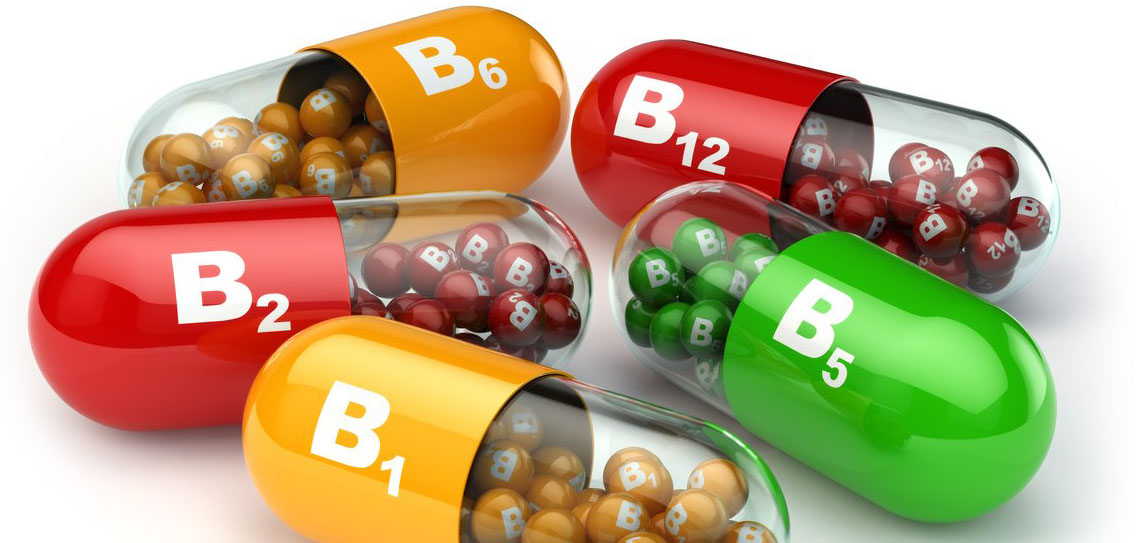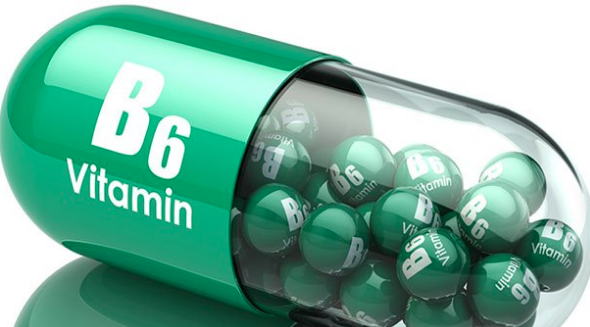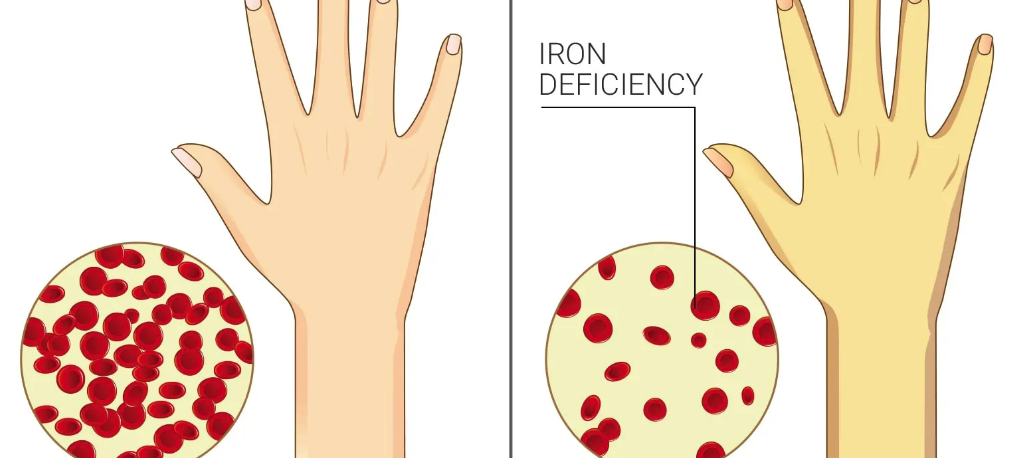There are eight essential B vitamins that are necessary for everyone to include in their diet (1).
The eight B vitamins include vitamin B1, B2, B3, B5, B6, B7, B9, and B12. All these vitamins have longer names or names you may hear more often than the coinciding number.
B vitamins are all water-soluble vitamins, meaning they can easily pass through your system through the urinary tract when they are consumed in excess (2). Essential B vitamins support many aspects of health throughout the body, from energy production to cellular formation, and much more (3).
Summary: The eight essential B vitamins are B1, B2, B3, B5, B6, B7, B9, and B12. These water-soluble vitamins are responsible for many body functions, especially energy production and cellular formation. Many people are deficient in B vitamins, especially B12 and B6.
Table of Contents
- Symptoms of Vitamin B Deficiency
- Symptoms of Vitamin B1 (Thiamine) Deficiency
- Symptoms of Vitamin B2 (Riboflavin) Deficiency
- Symptoms of Vitamin B3 (Niacin) Deficiency
- Symptoms of B5 (Pantothenic Acid) Deficiency
- Symptoms of Vitamin B6 Deficiency
- Symptoms of Vitamin B7 (Biotin) Deficiency
- Symptoms of Vitamin B9 (Folate) Deficiency
- Symptoms of Vitamin B12 (Cobalamin) Deficiency
- Conclusion
Symptoms of Vitamin B Deficiency
Are you eating or supplementing with enough essential B vitamins in your regular diet? Find out more about some common symptoms of each vitamin B deficiency, and how you can boost your levels today.
Symptoms of Vitamin B1 (Thiamine) Deficiency
Vitamin B1 deficiency not typically a common vitamin B deficiency. That is because many foods, animal-based, and plant-based, contain ample amounts of vitamin B1.
Common signs and symptoms of B1 deficiency include (4):
- Loss of appetite
- Weight loss
- Confusion
- Short-term memory loss
- Muscle weakness
- Heart problems
Severe thiamine deficiency leads to a condition called beriberi which has the added sypmtom of tingling and numbness in the feet (5). Some foods that contain vitamin B1 include beef, pork, whole grains, beans, seeds, peas, oranges, milk, yogurt, nuts, oats, and more (5), (6).
Summary: Vitamin B1 (thiamine) can be found in many animal and plant-based foods including legumes, pork, beef, seeds, peas, yeast, oranges, milk, nuts, and oats. B1 deficiency is uncommon, but will display symptoms of loss of appetite, weight loss, confusion, muscle weakness, and heart problems.
Symptoms of Vitamin B2 (Riboflavin) Deficiency
Vitamin B2 or Riboflavin deficiency, also known as ariboflavinosis, is a less common deficiency (7). The body needs riboflavin to metabolize fats, carbohydrates, and protein into glucose in the body (7), (8).
Common signs and symptoms of B2 deficiency include (9):
- Skin disorders
- Excess blood (hyperemia)
- Sores on the corner of the mouth
- Swollen or cracked lips (cheilosis)
- Hair loss
- Sore throat
- Itchy and red tongue
- Reproductive problems
B2 also functions as a powerful antioxidant, helping to minimize the build-up of free radical damage in the body (10). If you have a healthy digestive system and eat a balanced diet, it is unlikely that you will be deficient in vitamin B2 (11).
Summary: Vitamin B2 (riboflavin) deficiency is known as ariboflavinosis. B2 helps metabolize macronutrients into glucose in the body, providing optimal energy. It is also an antioxidant that fights free radical damage, and supports a healthy gut. Common symptoms of deficiency include skin issues, hair loss, sore throat, reproductive issues, itchy and red tongue, and cracked lips.
Symptoms of Vitamin B3 (Niacin) Deficiency
Vitamin B3 is better known as niacin. Niacin is an essential nutrient for getting energy from the food you eat as well as the development of cells in the body (12). Deficiency of niacin is also called pellagra.
Common signs and symptoms of pellagra include (13), (14):
- Rough skin that turns red or brown in the sun
- A bright red tongue
- Headaches
- Apathy
- Vomiting, diarrhea, or constipation
- Disorientation
A deficiency in vitamin B3 is uncommon.
Altough there is some mixed scientific evidence that those with heart disease may have some benefit from supplementation. High doses of niacin has been shown to improve blood cholesterol levels in those with heart disease, but it does not appear to help prevent heart attacks or strokes (15).
It is also important to note that if you do take niacin supplements, the niacin “flush” is quite common. That means you may get a red flushing look from supplementation. High doses of niacin supplements can also cause more serious side effects including low blood pressure, high blood sugars, nausea, and abdominal pain. Taking niacin to reduce blood cholesterol should only be done under the supervision of a physician (13).
Summary: Symptoms of vitamin B3 (niacin) deficiency include headache, apathy, depression, vomiting, diarrhea, disorientation, swollen mouth, and skin rashes. Deficiency is uncommon, but those who are low can take a supplement if needed. Taking a supplement can also lower heart disease risk factors.
Symptoms of B5 (Pantothenic Acid) Deficiency
Have you ever heard of vitamin B5? You may not be alone. This vitamin is present in most foods, so deficiences in pantothenic acid are very rare (16). Therefore, it is not as commonly discussed.
Common signs and symptoms of B5 deficiency include (17):
- Numbness and burning feet and hands
- Irritability
- Headache
- Stomach pain
- Vomiting or diarrhea
- Extreme tiredness
- Disturbed sleep
- Restlessness
- Loss of appetite
Vitamin B5 or pantothenic acid is present in many foods, and it is rare to become deficient. Some foods high in vitamin B5 include fish, eggs, mushrooms, lentils, sunflower seeds, sweet potatoes, avocado, chicken, beef, and more (18), (19).
Summary: Symptoms of vitamin B5 (pantothenic acid) deficiency include irritability, stomach pain, vomiting, burning feet, fatigue, and sleep disturbances. Fish, eggs, mushrooms, lentils, sunflower seeds, sweet potatoes, avocado, chicken, and beef are rich in B5.
Symptoms of Vitamin B6 Deficiency
Vitamin B6 plays a significant role in energy metabolism, brain development during pregnancy, and healthy immune function. A deficiency of vitamin B6 is very uncommon, but some people may be at a higher risk of deficiency (20).
The levels of vitamin B6 in the body may decrease with certain medications or health conditions. One medication that can potentially deplete vitamin B6 is oral contraceptives (21), (22). B6 can also be depleted with alcoholism or malabsorption (23).
Common signs and symptoms of B6 deficiency include (23):
- Cracks in the lips or corners of the mouth
- Swollen tongue (Glossitis)
- Anemia
- Itchy rashes
- Confusion
- Depression
- Weakened immune system
There are plenty of foods that are high in vitamin B6, including meat, fish, fortified cereals, dairy, nuts and legumes (24). Speak with your doctor if you have any concerns about your vitamin B6 levels.
Summary: Vitamin B6 deficiency symptoms include cracked lips and mouth, swollen tongue, depression, confusion, and reduced immunity. Many animal-based foods are high in vitamin B6. Medications such as oral contraceptives can deplete vitamin B6 levels, along with alcoholism and malabsorption issues.
Symptoms of Vitamin B7 (Biotin) Deficiency
Biotin is (B7) to support healthy hair, skin, and nails as well as general energy metabolism and cell function (25), (26).
Common signs and symptoms of B7 deficiency include (27):
- Thinning or hair loss
- Rash around the eyes, nose, mouth, anal area
- Seizures
- Pink eye
- Brittle nails
- Skin infection
- Nervous system disorders
- High levels of acid in blood and urine
Biotin deficiency is very rare because biotin is found in many foods, including meat, fish, eggs, nuts, fortified cereals, dairy products, and many fruits and vegetables (28).
Summary: Vitamin B7 deficiency is very rare because it is found in many foods. B7 (biotin) helps with hair, skin, and nail health. Symptoms of deficiency include hair loss, face rashes, seizures, pink eye, brittle nails, skin infection, nervous system disorders, and high acid levels in blood and urine.
Symptoms of Vitamin B9 (Folate) Deficiency
Vitamin B9 or folate deficiency is an uncommon deficiency in the US, but people with some conditions are at higher risk (29). Groups at higher risk include those living with malabsorptive disorders, alcoholism, and those with a specific gene mutation called MTHFR (30), (31).
Common signs and symptoms of B9 deficiency include (32):
- Shortness of breath
- Irritability
- Heart palpitations
- Difficulty concentrating
- Headache
- Weakness
- Anemia
Vitamin B9 or folate is especially necessary for pregnant women for the healthy brain and nerve development of a fetus. Make sure you eat a diet high in folate and supplement as needed according to your doctor during pregnancy (33).
Summary: Vitamin B9 (folate) deficiency is uncommon. Common signs of deficiency include shortness of breath, irritability, heart palpitations, difficulty concentrating, headache, and weakness. Women who are pregnant should also make sure to eat enough folate for optimal fetal development.
Symptoms of Vitamin B12 (Cobalamin) Deficiency
Most people get adequate amounts of B12 in their diet, although some having some conditions make absorbing vitamin B12 into the blood more difficult, increasing the risk for deficiency (34).
Common signs and symptoms of vitamin B12 deficiency include (35):
- Tiredness
- Memory loss
- Nerve problems, like numbness, tingling
- Loss of appetite
- Anemia
- Constipation
- Weakness
Vitamin B12, just like vitamin B6 is another vitamin that is necessary for the body to methylate optimally as well. This helps promote optimal formation nerve and blood cells and DNA. Many foods contain vitamin B12, including meat, dairy, fish, and eggs (36). There are few vegan food sources of B12, but they include fortified nutritional yeast and some seaweeds (37).
Summary: Vitamin B12 (cobalamin) deficiency is uncommon, but those with some conditions have difficulty absorbing vitamin B12. Tiredness, memory loss, nerve issues, loss of appetite, anemia, constipation, and weakness can occur if low in B12.
Conclusion
Everyone requires all eight essential B vitamins to function optimally. With a healthy, balanced diet, you may get adequate levels of all eight essential B vitamins, although supplementing can help many as well.
While many can benefit from B vitamin supplementation, others may feel they get an adequate amount with their diet alone.
Be sure to talk to your doctor or healthcare professional if you suffer from any of these symptoms so they can help maintain your energy, nerve health, memory, cognitive health, and much more today.














